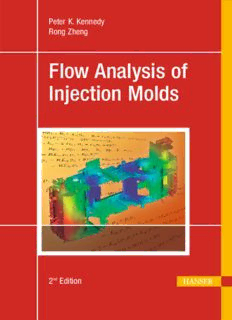
Flow Analysis of Injection Molds PDF
Preview Flow Analysis of Injection Molds
Peter K. Kennedy Rong Zheng Flow Analysis of Injection Molds 2nd Edition Kennedy, Zheng Flow Analysis of Injection Molds Peter Kennedy Rong Zheng Flow Analysis of Injection Molds 2nd Edition Hanser Publishers, Munich Hanser Publications, Cincinnati The Authors: Dr. Peter Kennedy, Helmet Investments, 141/99 Spring St., Melbourne, Victoria 3000, Australia Dr. Rong Zheng, School of Aerospace, Mechanical and Mechatronic Engineering, The University of Sydney, NSW 2006, Australia Distributed in North and South America by: Hanser Publications 6915 Valley Avenue, Cincinnati, Ohio 45244-3029, USA Fax: (513) 527-8801 Phone: (513) 527-8977 www.hanserpublications.com Distributed in all other countries by Carl Hanser Verlag Postfach 86 04 20, 81631 München, Germany Fax: +49 (89) 98 48 09 www.hanser.de The use of general descriptive names, trademarks, etc., in this publication, even if the former are not especially identified, is not to be taken as a sign that such names, as understood by the Trade Marks and Merchandise Marks Act, may accordingly be used freely by anyone. While the advice and information in this book are believed to be true and accurate at the date of going to press, neither the authors nor the editors nor the publisher can accept any legal responsibility for any errors or omissions that may be made. The publisher makes no warranty, express or implied, with respect to the material contained herein. Library of Congress Cataloging-in-Publication Data Kennedy, Peter (Peter K.) Flow analysis of injection molds / Peter Kennedy, Rong Zheng. -- 2nd edition. pages cm Includes bibliographical references and index. ISBN 978-1-56990-512-8 (hardcover) -- ISBN 978-1-56990-522-7 (e-book) (print) 1. Injection molding of plastics. 2. Mathematical modeling. I. Zheng, Rong, 1947- II. Title. TP1150.K45 2012 668.4’120685--dc23 2012025721 Bibliografische Information Der Deutschen Bibliothek Die Deutsche Bibliothek verzeichnet diese Publikation in der Deutschen Nationalbibliografie; detaillierte bibliografische Daten sind im Internet über <http://dnb.d-nb.de> abrufbar. ISBN 978-1-56990-512-8 E-Book-ISBN 978-1-56990-522-7 All rights reserved. No part of this book may be reproduced or transmitted in any form or by any means, electronic or mechanical, including photocopying or by any information storage and retrieval system, without permission in writing from the publisher. © Carl Hanser Verlag, Munich 2013 Production Management: Steffen Jörg Coverconcept: Marc Müller-Bremer, www.rebranding.de, München Coverdesign: Stephan Rönigk Printed and bound by CPI buch bücher gmbh Printed in Germany TomyFather ProfessorZhi-ZhongZheng forhisloveandprofessionalspirit thathaveguidedmylife. —RongZheng TomyChildren WilliamandAnthony fortheirsupport, understandingandlove. —PeterK.Kennedy Acknowledgements We wish to record our sincere thanks to Professors Roger I. Tanner (University of Sydney), H.E.H. Meijer (Technische Universiteit Eindhoven), Xi-Jun Fan (University of Sydney), and NhanPhan-Thien(NationalUniversityofSingapore—formerlyoftheUniversityofSydney). Manyresultsandideaspresentedinthisbookcamefromtheirworksandfromcollaborative research work with them and their colleagues. From this book one may see their deep in- fluenceonourwork. ThanksarealsoduetoProfessorCharlesTucker(UniversityofIllinois, Urbana-Champaign),ProfessorsGerritPeters,andPatrickAnderson(bothofTechnischeUni- versiteitEindhoven)forfruitfuldiscussionsandadvicefromwhichwebenefited. WealsowanttothankourformerMoldflowcolleaguesinMelbourne, AustraliaandIthaca, USAwithwhomwebothusedtowork.Ourinteractionswiththembroadenedourknowledge inseveraldifferentaspectsandleadtodeepfriendships. Theirworkcanalsobeseeninthis book. MuchofourearlyworkwasconductedwithseveralconsortiumslocatedinFranceandspon- soredbyMoldflowCorporationandsomeotherindustrialpartners. Inparticular,wewould liketothankProfessorsG.Regnier(formerlyENSAMParis,nowArtsetMétiersParisTech),R. Fulchiron(UniversitédeLyon),D.Delaunay(UniversitédeNantes),andDr. V.Leo(Solvay) forparticipationinseveralprojectsthatshowedhowcomplextheinjectionmoldingprocessis butneverthelessproducedsomeresultsthatareofpracticaluse. WeareindebtedtotheAustralianCooperativeResearchCenterforPolymersforprovidingan opportunity of doing collaborative research with research teams from Monash and Sydney Universities.Inparticular,weweregratefultoobtainaccesstotheAustralianSynchrotron. SpecialthanksgototheformerMoldflowCorporation(nowpartofAutodeskInc.)forprovid- inganexcellentworkingenvironmentandconstantsupporttobothofusduringtheperiodwe wereworkingthere. Professors H.E.H. Meijer, Nhan Phan-Thien, and Roger I. Tanner reviewed the draft of the wholebookandmadeveryvaluablecommentsandsuggestionsforimprovement;theirhelp isgratefullyacknowledged. Wealsowishtothanktheeditorsofthisbook’spublisherfortheirpatienceandprofessional assistance. Onthepersonalside,wewanttothankourfamiliesforthelove,understanding,andencour- agementthatsustainedusduringourconfrontationwithanimportant,butdifficult,industrial problem. Preface Injection molding is an ideal process for fabricating large numbers of geometrically com- plexparts. Manyeverydayitemsareinjectionmolded: mobilephonehousings,automobile bumpers, television cabinets, compact discs, and lunch boxes are all examples of injection moldedparts.Partsproducedbytheprocessarealsobecomingcommonplaceinlessobvious applications.Forexample,therelativelynewareaofmicro-injectionmoldingisprovidingnew methodsofdrugdeliveryandopticalcouplers[195]. Variationsofinjectionmoldingthathavebeendevelopedovertheyearsincludeco-injection ortwo-componentmolding,waterinjection,andgas-assistedinjectionmolding(GAIM).All theseprocessesprovideadditionalscopefordesignersofplasticparts.Excellentexamplesare provided by Neerincx [267] and Neerincx et al. [268,269]. Indeed it is possible to combine thesevariationswitheachotherorinjectionmoldingtoachieveotherprocesses.Inparticular, NeerincxandMeijercombinedGAIMandtwo-componentmolding[270]toproduceapart withuniquequalities. Animportantcharacteristicofinjectionmolding, includingvariations, isthatitmaynotbe possibletofixapartdefectinproductionbysimplyvaryingprocessconditions. Frequently themoldmustbemodifiedtoovercomeaproblem.Thisisexpensiveandcostsvaluabletime. Itisfarbettertoavoidproblemsinthedesignphasethantofixtheminproduction. Conse- quentially,simulationofinjectionmoldingisindustriallyvaluable. Notsurprisingly,thereareseveralcommercialcompaniesofferingsoftwareforsimulationof injectionmoldinganditsvariants. Duetothecomplexityofthephysicsoftheprocess,vari- ousassumptionsaremadetosimplifythemathematicalmodelusedforsimulation. Overthe yearsmanydescriptionsofmodelingandsimulationofinjectionmoldinghaveappearedin academicjournalsandbooks. Whilereadilyavailabletospecialistreaders,anunderstanding ofprinciplesusedinsimulationsoftwareisdifficultfornonspecialiststoobtain. Thisisdue tothemulti-disciplinarynatureofsimulationsoftware.Inparticular,aspectsofrheology,ma- terialsscience,andnumericalmethodsareused. Therearesomeexcellentbooksonpolymer processing that discuss injection molding. One of the original classics was by Tadmor and Gogos[351]. ThiswasfollowedbyTucker’sbook[368]whichfocusedonmodelingforcom- putersimulation. Morerecently, OsswaldandHernández-Ortiz[279]providedanoverview ofmodelingandsimulationforpolymerprocessing,whileKamaletal.[190]haveproduceda bookfocusedoninjectionmoldingthatdiscussesvariationsandotheraspectsoftheinjection moldingprocess. Giventheimportanceofinjectionmoldingasaprocess,andthesimulationindustrythathas growntosupportit,webelievethereisaneedforabookthatdealssolelywithmodelingand simulationofinjectionmolding. Oneoftheauthorswroteabookin1995[196]alongthese lines. Itdiscussedfillingandpackingphasesimulation,butisnolongerinprint. Moreover, therehavebeenmanydevelopmentsinmodelingandsimulationsincethattime. Thecurrentbookisintendedtoaddressthisneed.Itprovidesacomprehensivedescriptionof modelingandsimulationofinjectionmolding.Whilesomepartsofthebookmayberelevant
Description: